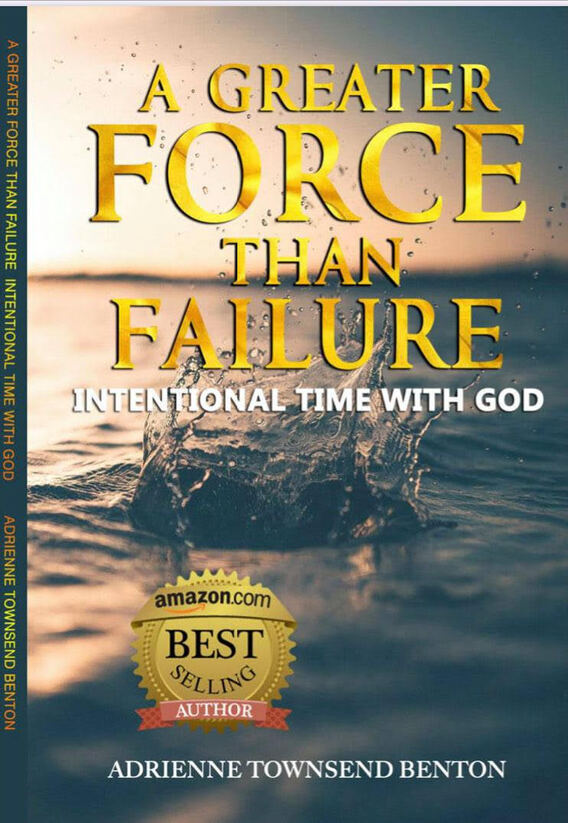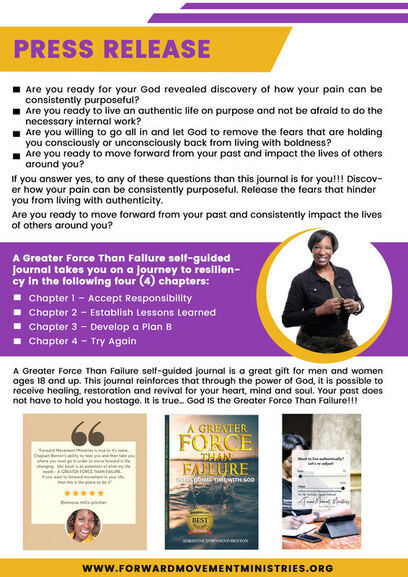- Published on
Resilient Leadership Spotlight : A Greater Force Than Failure by Adrienne Townsend Benton
Have you ever failed? Have you ever given your best effort, yet you still missed the mark? How did you feel after you tried and failed? Sad, rejected, discouraged? No one is perfect, so maybe, just maybe, you have even failed more than once? If you answered yes, don’t worry...you are not alone. The pages in this journal are here to walk with you on the journey where you recognize and employ Godly faith as the greater force than fear in your life. Fear = False Evidence Appearing Real. Remember, failures do not have to be fatal. You can recover!
In A Greater Force than Failure, the author emphasizes the importance of taking time to focus on you intentionally. Slowing down from the busyness of the day-to-day hustle and learning to replenish yourself mentally and spiritually will significantly impact how you process setbacks. Your perspective will change as you spend time engaging with God and shifting your focus to positive affirmations of faith.
From Barriers and Boundaries on this gem of a book!
We are so honored here at B & B to spotlight Adrienne's work in A Greater Force Than Failure. Please take the time to engage her work and this book. Find out more about her at Forward Movement Ministries. Incredible passion for honest perspectives and an authentic self.
Accepting responsibility, establishing lessons learned, developing plans, and trying again after failing are integral components in building resilience. These aspects contribute to an individual's ability to bounce back from challenges, adapt to adversity, and thrive in the face of setbacks.
Accepting responsibility is a fundamental aspect of personal and professional development. It requires individuals to recognize the impact of their actions, whether positive or negative, and take ownership of the outcomes. Accepting responsibility is not about assigning blame but rather about acknowledging one's role in a situation. This mindset fosters accountability, builds trust, and promotes a culture of transparency. By embracing responsibility, individuals contribute to a healthier and more resilient environment where learning from mistakes becomes a powerful catalyst for growth. This accountability mindset fosters resilience by promoting proactive problem-solving and the determination to make positive changes.
Establishing lessons learned is a proactive approach to continuous improvement. It involves reflecting on past experiences, both successes, and failures, and extracting valuable insights. This process allows individuals and organizations to identify patterns, understand what worked well and what didn't, and apply these lessons to future endeavors. Establishing lessons learned is not just about avoiding past mistakes but also about replicating successful strategies. It is a strategic tool that contributes to informed decision-making, enhances problem-solving capabilities, and lays the foundation for a more resilient and adaptive approach to challenges.
Reflecting on past experiences, both successes and failures, enables individuals to extract valuable insights. These lessons become tools for navigating future challenges more effectively. By learning from the past, individuals can anticipate potential obstacles, make informed decisions, and adapt their strategies, thus building resilience through a continuous improvement mindset.
Developing plans is a critical skill in achieving goals and objectives. Whether in personal endeavors or professional projects, a well-thought-out plan serves as a roadmap to guide actions toward success. Developing plans involves careful consideration of goals, resources, and timelines. It requires individuals to think strategically, set realistic milestones, and allocate resources efficiently. Effective planning not only increases the likelihood of success but also provides a framework for measuring progress and adjusting strategies as needed. It is a dynamic process that empowers individuals to navigate complexity and uncertainty with confidence.
Developing plans enhances resilience by providing a structured framework for goal attainment. A well-crafted plan allows individuals to navigate uncertainties with confidence, as they have a roadmap to guide their actions. The planning process involves anticipating challenges, setting realistic expectations, and allocating resources strategically. This preparedness contributes to resilience by helping individuals stay focused and adaptive in the face of unexpected obstacles.
Trying again after failing is a testament to resilience and perseverance. Failure is an inevitable part of any journey, but how individuals respond to setbacks defines their path to success. Embracing a mindset of trying again involves learning from failures, adapting strategies, and maintaining a positive outlook. It requires a willingness to iterate and improve, turning each failure into a valuable learning experience. Trying again after failing is not just about bouncing back; it's about coming back stronger, armed with insights gained from adversity. This attitude cultivates resilience, builds character, and positions individuals for long-term success in the face of challenges.
Trying again after failing is perhaps one of the most direct ways to build resilience. Failure is part of life, but the ability to embrace setbacks and move forward is a hallmark of resilience. Each attempt, even if unsuccessful, contributes to a reservoir of experience and knowledge that strengthens an individual's ability to face future challenges with resilience and perseverance.
Accepting responsibility, establishing lessons learned, developing plans, and trying again after failing are integral components in building resilience. These aspects contribute to an individual's ability to bounce back from challenges, adapt to adversity, and thrive in the face of setbacks.
Accepting responsibility is a fundamental aspect of personal and professional development. It requires individuals to recognize the impact of their actions, whether positive or negative, and take ownership of the outcomes. Accepting responsibility is not about assigning blame but rather about acknowledging one's role in a situation. This mindset fosters accountability, builds trust, and promotes a culture of transparency. By embracing responsibility, individuals contribute to a healthier and more resilient environment where learning from mistakes becomes a powerful catalyst for growth. This accountability mindset fosters resilience by promoting proactive problem-solving and the determination to make positive changes.
Establishing lessons learned is a proactive approach to continuous improvement. It involves reflecting on past experiences, both successes, and failures, and extracting valuable insights. This process allows individuals and organizations to identify patterns, understand what worked well and what didn't, and apply these lessons to future endeavors. Establishing lessons learned is not just about avoiding past mistakes but also about replicating successful strategies. It is a strategic tool that contributes to informed decision-making, enhances problem-solving capabilities, and lays the foundation for a more resilient and adaptive approach to challenges.
Reflecting on past experiences, both successes and failures, enables individuals to extract valuable insights. These lessons become tools for navigating future challenges more effectively. By learning from the past, individuals can anticipate potential obstacles, make informed decisions, and adapt their strategies, thus building resilience through a continuous improvement mindset.
Developing plans is a critical skill in achieving goals and objectives. Whether in personal endeavors or professional projects, a well-thought-out plan serves as a roadmap to guide actions toward success. Developing plans involves careful consideration of goals, resources, and timelines. It requires individuals to think strategically, set realistic milestones, and allocate resources efficiently. Effective planning not only increases the likelihood of success but also provides a framework for measuring progress and adjusting strategies as needed. It is a dynamic process that empowers individuals to navigate complexity and uncertainty with confidence.
Developing plans enhances resilience by providing a structured framework for goal attainment. A well-crafted plan allows individuals to navigate uncertainties with confidence, as they have a roadmap to guide their actions. The planning process involves anticipating challenges, setting realistic expectations, and allocating resources strategically. This preparedness contributes to resilience by helping individuals stay focused and adaptive in the face of unexpected obstacles.
Trying again after failing is a testament to resilience and perseverance. Failure is an inevitable part of any journey, but how individuals respond to setbacks defines their path to success. Embracing a mindset of trying again involves learning from failures, adapting strategies, and maintaining a positive outlook. It requires a willingness to iterate and improve, turning each failure into a valuable learning experience. Trying again after failing is not just about bouncing back; it's about coming back stronger, armed with insights gained from adversity. This attitude cultivates resilience, builds character, and positions individuals for long-term success in the face of challenges.
Trying again after failing is perhaps one of the most direct ways to build resilience. Failure is part of life, but the ability to embrace setbacks and move forward is a hallmark of resilience. Each attempt, even if unsuccessful, contributes to a reservoir of experience and knowledge that strengthens an individual's ability to face future challenges with resilience and perseverance.


